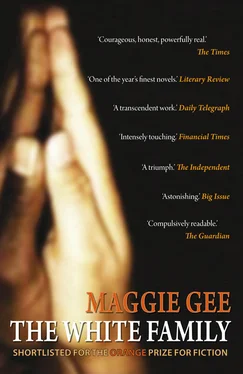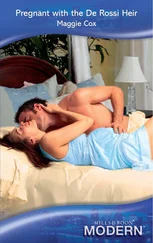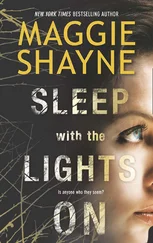We had two or three butchers — three, after the war. They used to dress up properly, in blue striped aprons. Then later with little white trilby hats. Then the windows started to look a bit patchy, because butchers needed to have lovely full windows, gleaming chops and ribs and legs, not grey lumps eked out with plastic parsley. Last November the one surviving butcher closed. ‘We had hoped to keep going till Christmas, Mrs White. I don’t like to let the customers down.’ His face had been pallid as the chicken-legs. ‘Don’t worry, we’ll go down to Gigamart,’ said a stringy young woman with a bright yellow crewcut, dragging her toddler out of the shop. May wanted to kick her, but she did have a point. If they’d had a car, she would have done the same. May had been keen to drive, at one stage, when Ruby and George had got their first motor, but Alfred was always too busy to learn, and he thought he’d look silly being driven by a woman. And now I’ll be stranded, she thought resentfully, then realized that meant if Alfred dies …
There used to be a fish-monger’s with marble slabs on which beautiful blue and pink bodies gleamed. She used to buy roes, and do them on toast …
When we were first married. It was Alfred’s favourite. His eyes were so blue when he smiled at me. And kippers, for breakfast. And the odd bit of plaice. He thought fish was healthy, though the smell was awful, and I bought it regularly, twice a week, but what good did it do him, what good, what good?
May stopped, found her hanky, pulled herself together. She couldn’t go crying in the street at her age.
She passed the betting-shop. She rarely looked in through the plate-glass windows with their crude graphics. It seemed like catching men at something shameful; they went in looking furtive, came out looking sad. In the past ten years it had doubled in size, to three times the size of a normal shop. May had bet twice in her life, both times on the Derby, both times when the names of the horses seemed lucky, ‘Early Sherbet’, which reminded her of Shirley, and ‘King Alfred’, which of course — of course. And she lost the money, naturally. It was a sort of sink, soaking up people’s money. But all sorts of betting was popular, these days. The paper-shop she favoured did the Lottery. A huge yellow sign beckoned from the window. Whereas George had turned down the chance to have the Lottery. ‘Ruby says it’s taking people’s money for nothing. They don’t have a lot to spare, round here.’
They did. She saw them. A tenner at a time, and the poorest people were the worst of the lot. A tenner on Saturday and ‘instants’ on weekdays. Betting and boozing, as other things dwindled. Till all that was left would be the pub and the betting-shop. Nowhere for people like May to go.
The shopkeepers all used to know my name … They knew our kids. Looked out for them. Shirley never went out without being given toffees. And the mothers all used to meet up in the shops. We stood there talking and blocking up the gangways till the shopkeepers started giving us looks. But it wasn’t bad for business, not really. The local shops were like a club. If you asked, they would get things in just for you. They even cashed cheques when the bank was closed. It was like a dream now, all that bustle and variety, people who smiled and knew your name … In Gigamart, the staff all looked like robots. Stacking shelves by numbers, in nylon uniforms.
It was all going faster than May had realized. Almost trotting down the street, her blue coat clutched around her, she saw that more than half the shops were boarded up, or had their fronts covered with aluminium shutters, which rattled coldly in the winter winds. ‘To Let’, the boards said, hopefully, but no one new came except charity shops, and they already had three, full of wrong-coloured garments. So the boards got battered, and looked grimy, guilty, each one a confession of failure and emptiness. It was over, Hillesden Rise was over, over, and May found the tears welling up again, and realized she was crying for herself and Alfred and the silly young couple they had once been.
We liked it here. It was our — El Dorado. Once upon a time, it had all we needed.
His mother and father. He would never escape them. He was nothing at all, except their son.
Until he made his millions with MediaNet. Then he’d have his own place. In Brighton, maybe. Those pier thingies … So white in the sunlight. He and the lads had gone down one day, and before they’d got blasted, he’d seen the sea, very far away, blue and unfrightening behind all the pebbles, and the piers like — big white palaces. Two of them. Long. With lots of bits. He would have one, his family the other.
‘So how’s your father? I’m talking to you.’
Dirk wished he’d belt up. He enjoyed his own thoughts. In the quiet moments. The quiet minutes. The quiet half-hours, because today was quiet. Weekends were quiet. Well, weekdays were quiet. It was always quiet, except for George coughing.
‘I said, how’s your dad.’
‘Uh … All right.’
‘So. How about yours truly popping up to see him? Tomorrow would be good. For the wife and self.’
Dirk didn’t want him coughing over his father. George’s breath was lethal at twenty paces. ‘Like I said, it’s like, just family, at present. My brother’s just come back from abroad. From — overseas.’ That gift with words. Whatever the sodding teachers said, always comparing him to Darren and Shirley.
(Though Mum seemed to think he was pathetic at English. ‘Not your best subject. Never mind.’ ‘What is my best subject then?’ he’d asked. A long silence while she gawped at him.)
‘That would be — Darren?’
‘Yes.’
‘Brilliant boy. Outstanding. Went down the brain drain, didn’t he?’
Dirk felt like hitting his great ugly mug. How dare he say Darren had gone down the drain? ‘You’re going peculiar in your old age. He’s famous, Darren. Everyone knows him.’
‘Do they? Get on!’ George was bloody laughing.
‘He’s Darren White, the People’s Friend. He’s a household name, my brother is. He has a column in The Mail every week. He e-mails it from the USA.’
That shut him up for a moment. George wouldn’t even have a photocopier here, because he was frightened of machines. And Dirk did most of the addition in his head, because George said he was better than a calculator. It was true that numbers were easy for him. But he had refused to do maths GCSE. It was boring. He knew it, so why write it down?
‘I’d be very happy to see your brother,’ George said in a sickly, syrupy voice. ‘Household name, is he, now? I remember him when he was four years old. Lovely little lad, curly brown hair. Apple of his father’s eye.’
It was a pool of mush. Spreading out towards him. Darren wouldn’t give him the time of day.
‘So I’ll pop along tomorrow. Have a word with Alfred. Like to have a word. Just show my face.’
Why couldn’t he wait till Dad comes out? They saw each other twice a week. There’s something up, I know there is.
Maybe he’s going to retire, at last. Maybe he wants to tell my dad it’s time for him to hand things over to me. Sound him out. See if it’s OK, like. See if there’s any hope of me accepting.
Look who it is. It’s not my day. Wanker-in-Chief, King of the Wristers. Thomas Lovell the Librarian. Grinning away like a Cheddar Cat.
‘Good morning, Dirk,’ he says to me. That’s out of order, saying my name! Just because he saw me in the hospital doesn’t suddenly make us best of friends.
‘Ah, Thomas,’ says George. ‘How’s the book racket? ’ Rubbing his great fat hands together as if he was squashing a pack of butter.
Читать дальше












